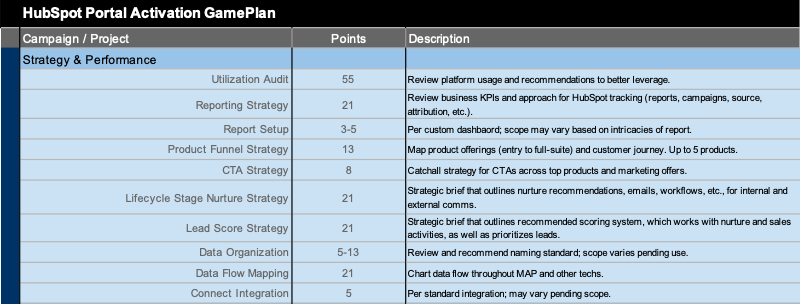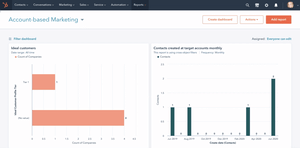“We expect global spending on marketing automation tools to surpass $25 billion by 2023,” according to Forrester.
That’s a pretty astonishing number, but we honestly aren’t surprised. Why not take advantage of automation platforms that can completely transform your program with the right approach?Regardless of which software you use, consider: Are you maximizing full use of its capabilities? Some have so many features and functionalities that it might take some time to truly master all it has to offer.
After all, the software is only as good as how well you use it. That’s why we helped to pioneer the partner program back in 2007. And now, it’s also why we put together a comprehensive GamePlan packed with strategies and activities to fully activate a HubSpot portal. (If you don’t have HubSpot, don’t worry. You can still leverage most of these strategies with any marketing automation platform. We have experience using these tactics with platforms including Marketo, Kapost, Act-On, SquareSpace, Wordpress, among others.)Starting with this blog post, we are going to break down each section of the GamePlan and dive into details for each recommended action item—so you can take action in your portal! You can download the full GamePlan here and reference it as you continue through the full series.  Keep reading for 10 strategies that build a successful foundation for marketing automation success.
Keep reading for 10 strategies that build a successful foundation for marketing automation success.
PS: If you download the GamePlan, you’ll notice that we assign points to projects based on value creation rather than hours. If you aren’t familiar, you can read more about PR 20/20’s proprietary Point Pricing model here.
Insights to Improve Strategy and Performance
Whether you’re in the process of setting up HubSpot or celebrating your 10-year milestone with HubSpot, it’s important to take a step back and assess operations. A full utilization audit is a smart first step before taking steps to better your reporting processes. Below are the three strategies we recommend creating for improved strategy and performance.
1. Utilization Audit: Before doing anything else, perform a full review of platform usage. Document areas of weakness or tools that you have yet to leverage, and document those that your team uses most often. Consider outside technologies too, and how you could bring them under one platform. For example, many teams use various social media monitoring and scheduling tools, when much of the capabilities are now possible in HubSpot.
You’ll want to revisit your utilization audit as often as new products and features are rolled out across the platform. We recommend revisiting at least once each year.
2. Reporting Strategy: Review your business goals, marketing goals, and the work being done. Note which analytics tools and reports your team already uses frequently in HubSpot, plus those you might benefit from adding. Document what’s on your dashboard and why. From there, look at how you can connect the dots to funnel activity up to outcomes—and outcomes up to bottom-line business goals. For more, read HubSpot's guide to getting started with reports and dashboard tools.
3. Report Setup: Next, take action on your reporting strategy. Set up new (and if needed) custom reports in HubSpot, and save them for future tracking. We integrated our HubSpot portal with Databox for advanced reporting capabilities. Learn more about our Databox Partner Program.
Master Conversion Optimization
With reporting in place, address your customer journey. Are you serving up prospect and customer content or resources when they need it most? Below are several strategies to take your conversion optimization to the next level.
4. Product Funnel Strategy: Map out your full product funnel and determine points of friction (i.e. exit points on your site), or conversely, points of strength (i.e. high click rates for a demo CTA). Compare that to what your ideal product funnel looks like and make suggestions to get there. You might need to fill gaps where your customer seems to be looking for more information, or you might need to simply make it easier to convert.
5. CTA Strategy: Align your product funnel with your primary and secondary calls-to-action (CTA) sitewide. Think through all aspects of your CTA, from language to color to shape, and consider if some require A/B testing to determine the right offer. From there, set up your CTAs in HubSpot; we suggest using a consistent naming method so crystal clear how to leverage each one.
6. Lifecycle Stage Nurture Strategy: Once you have leads in our HubSpot database, how are you nurturing them from new contact all the way to a customer advocate? In this strategic brief, take time to outline nurture recommendations and enticing offers. This strategy should include sample email templates for business development representatives, and workflows aligned with behavior or demographic data. These could be for both internal and external communications. Once your approach is final, you can draft and load your manual or automated emails in HubSpot.
7. Lead Score Strategy: Improve personalization and segmentation by employing lead scoring in HubSpot. But before you start assigning values, compile a list of signals that predict the probability that a lead will make a purchase. This might be a particular page view, a CTA click, a download, etc. By automating the assignment of scores in HubSpot, you can better prioritize those contacts that might need one-on-one engagement. Get more information about predictive lead scoring from HubSpot's Knowledge Base.
Be Smart About Your Data
Data management can spiral out of control, or it can be quite impactful. If you’d prefer the latter, we suggest acting on the following strategies in HubSpot.
8. Connect Integrations: Integrate HubSpot with all the other tools being leveraged to keep your data in one succinct place. Check out HubSpot’s Integrations Content Library to see what’s new and what’s possible with your apps.
9. Organize Your Data: Data can be messy. Stay organized and recommend a naming standard across all data points for your team. Plus, you’ll want to ensure your team takes the necessary steps to be GDPR compliant. You can read more about it here.
10. Data Flow Mapping: Mapping your data across the full technology stack will help your team to refine your processes for data intake, and to identify gaps in the customer journey. Start by determining what data you’re accessing, and how it’s flowing in and out of your automation platform.
Optimize Your HubSpot Portal Today
Ready to get more value from your HubSpot portal? Click the link below to download the full HubSpot Activation GamePlan. Or contact a member of our team to talk more about HubSpot. We can help activate the HubSpot GamePlan or provide a simple consult. Happy HubSpotting!

%20Logo_BlueOrange_Trademark.png?width=800&height=269&name=Ready%20North%20(RN)%20Logo_BlueOrange_Trademark.png)




.jpg?width=300&name=Services%20Hub%203%20(3).jpg)



COMMENTS